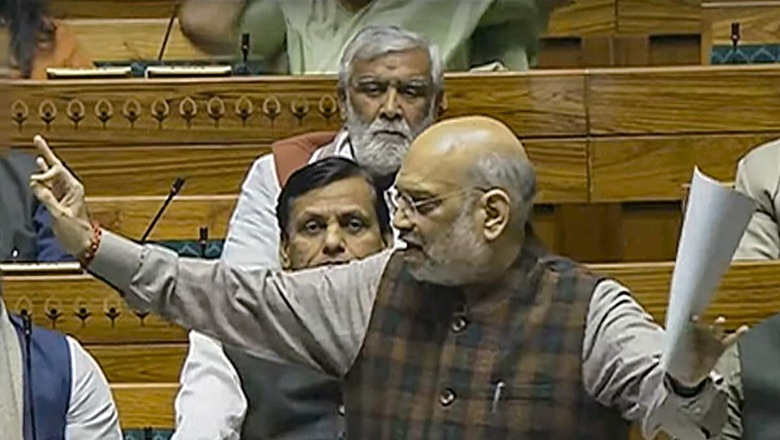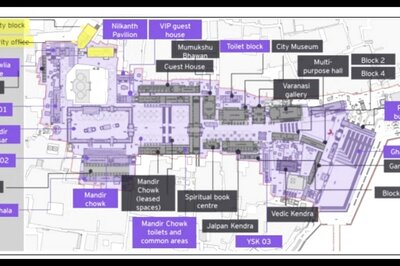
views
Around 150 meetings held by Union Home Minister Amit Shah and 3,200 suggestions received from 18 states, six Union Territories, the Supreme Court of India, 16 High Courts, 27 judicial academies, several MPs and bureaucrats – the mammoth exercise to decolonise India’s criminal justice system crossed the Lok Sabha hurdle on Wednesday with the Lower House passing three key bills to replace the British-era IPC, CrPC and the Evidence Act.
The focus of the Bharatiya Nyaya (Second) Sanhita, Bharatiya Nagarik Suraksha (Second) Sanhita and the Bharatiya Sakshya (Second) Bill, Amit Shah said, is on delivering speedy justice rather than handing down punishment. The legislations have a clear definition of terrorism and scrap sedition as a crime while introducing a new section titled “offences against the State”.
The bills set timeline for initiating criminal proceedings, arrests, investigations, filing of chargesheets, proceedings before magistrates, trial, bail, judgment, and mercy petition, among others. One of the sections also emphasises on wrapping up cases within 45 days.
The bills were first introduced during the Monsoon Session of Parliament in August. After the Standing Committee on Home Affairs made several recommendations, the government decided to withdraw the bills and introduced their redrafted version last week.
Here’s a look at the important aspects of the new criminal justice legislations:
What Has Changed
The amendments to the Bharatiya Nyaya Sanhita, which replaced the Indian Penal Code (IPC), encompass comprehensive restructuring. From 511 sections earlier to 358 now, notable changes include the introduction of 20 new offences, tougher penalties with term of imprisonment raised in 33 cases, and heightened fines in 83 instances. Additionally, mandatory minimum sentences have been instituted for 23 offences, and community service has been prescribed as a penalty in six cases. Simultaneously, 19 sections have been repealed, marking a substantial revision of the Indian Penal Code.
Similarly, the Bharatiya Nyaya Sanhita, which replaces the Criminal Procedure Code (CrPC), has undergone significant modifications. The act now comprises 531 sections, an increase from 484 under the CrPC. This alteration involves nuanced adjustments in a total of 177 provisions, with the incorporation of nine new sections and 39 subsections. Furthermore, 44 new provisions and clarifications have been seamlessly integrated. The inclusion of timelines in 35 sections and the provision for audio-video in 35 instances underscore the contemporary adaptability of the legislation. In tandem, 14 sections have been repealed, aligning the Indian Civil Security Act with evolving legal dynamics.
The Bharatiya Sakshya Bill, which will replace the Indian Evidence Act, has experienced a massive shift as well. The section count has risen from the original 167 to 170, reflecting changes in 24 sections. Notable adjustments include the addition of two new sections and six sub-sections, coupled with the removal of six sections. This calibrated transformation seeks to enhance the efficacy and relevance of the Indian Evidence Act in the evolving legal landscape.
Shift in Focus
According to the government, during British rule, the priority was to safeguard against murders, abuse of women, and protection to those who were in power. The new laws prioritise offences against women, children, homicide, and crimes against the nation. The focus of the new legislations is to provide justice and protect human rights.
Crimes Against Women and Children
A new chapter, titled ‘Crimes Against Women and Children’, has been added to the Bharatiya Nyaya Sanhita to address sexual offenses. Proposed amendments include changes to provisions related to rape of women under 18 years.
Gang-rape of minor girls has been deemed as an offence punishable with life imprisonment or the death penalty. In all gang-rape cases, provisions for a 20-year sentence or life imprisonment have been made. A new category to punish the gang-rape of girls under 18 has been introduced. There is also provision of punishment for individuals making false promises of marriage without genuine intent.
Terrorism
The government has defined terrorism for the first time through these new laws. Section 113 states that anyone who commits an act of terrorism causing death, property damage, or currency manipulation will be considered a terrorist. Punishment for terrorist acts includes the death penalty or life imprisonment without parole.
The government has also, for the first time, defined organised crime. Unlawful activities carried out by a syndicate have been made punishable. The new provisions include armed destructive activities, separatist activities, or actions endangering India’s sovereignty, integrity, and unity. Small organised crimes are declared offences, carrying up to seven years of imprisonment under Section 112.
Mob Lynching & Snatching
A new provision has been included to address crimes related to murder based on factors such as race, caste, community etc, with the provision of life imprisonment or the death penalty. To deal with snatching cases, stricter penalties shall be imposed in situations where victims are either temporarily or permanently disabled due to serious injuries.
Victims’ Rights
The new legislations also protect and promote victims’ rights. The right to obtain a free copy of the FIR, notification to the victim about the progress of the investigation within 90 days, inclusion of provisions for victims to receive crucial information about their cases through mandatory disclosure of police reports, FIRs, and witness statements have been added.
Sedition
Sedition has been done away with completely in the new laws. Section 152 now defines crimes against the nation. “Anyone who intentionally or purposefully, through spoken or written words, symbols, or visual representation, or through electronic communication or the use of financial resources, incites or attempts to incite armed rebellion, destructive activities, or separatist activities, or encourages the feelings of separatism or endangers the sovereignty, integrity, and unity of India, or participates or engages in such activities, shall be punished with life imprisonment or imprisonment up to seven years, and a fine may also be imposed,” the Bharatiya Nyaya (Second) Sanhita says.




















Comments
0 comment